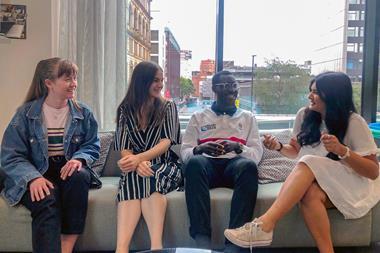If you are interested in a career in science communication, whether public engagement or science writing, it pays to get experience first, advises Caroline Tolond
If you are interested in a career in science communication, whether public engagement or science writing, it pays to get experience first, advises Caroline Tolond
Q I’ve got a year to go before I graduate and am starting to think about what I want to do after my degree. Last month’s profile of a science communicator really sparked my interest and I think I’d like to develop a career in this area (Chemistry World, June 2009, p75). Where should I start?
A My first piece of advice is to start by considering where on the broad science communication careers spectrum you would like to be working. It ranges from engaging with the public, as in last month’s article, to public relations and developing policy. A useful place to investigate these career areas is Prospects. This site has many job profiles which include information on entry routes and career progression, as well as links to other specialist sources of information about each job area.
Having looked into different types of scientific communication I suggest you try to get some experience in the career areas of interest before you graduate. Over 240,000 graduates enter the job market each year and so having relevant experience on your CV will help you stand out from the crowd, although any voluntary or paid work you have will be worthwhile.
Where can you find out more about the different options and get some experience? Well, if you are keen on public outreach activities then have a look at the British Interactive Group, which represents people involved in interactive science projects in the UK. Their email list is a useful way to find out what is going on and to keep in the loop about vacancies that are often not widely advertised. Other ways to get some experience in the next year could include volunteering at your university to support schools outreach projects, becoming a Stem ambassador or by supporting ChemNet, the RSC’s group for young people studying chemistry.
Alternatively, if writing about science rather than running public activities is of more interest, then writing articles for publication would be valuable experience and allow you to build a portfolio of your work. You could submit articles to your student or local newspaper or get involved with online media - you could even start your own blog. Internships can also provide valuable experience and good networking opportunities; although in the main they are not salaried, often only offering a stipend or expenses.
The RSC and Nature both have scientific journalism internships available each year, but if you would prefer something with a political slant then have a look at W4MP, which advertises positions to work for an MP, as well as for the lobbying groups that are active in parliament. You should also keep an eye on the UK government’s new graduate internship programme, which is due to launch this month, as there may be interesting short-term opportunities that arise from the scheme. You can find out more at Graduate Talent Pool.
As with many specialist areas, taught Masters courses can also build up your experience in areas such as scientific communication, journalism and public relations. It’s worth doing a cost-benefit check to see if the lost earnings and course costs would be worth more than a year’s experience on the job (even if it is a basic entry-level position). Obviously, if employers specify the qualification, you would gain through another year’s study.
The current recession will also affect the options open to you, particularly if you’re aiming for a career where advertising revenues are essential, such as in local newspapers. Keep up to date with development with publications such as The Guardian’s media supplement (published on a Monday).
It isn’t always easy finding an entry route into your ideal career, so it’s certainly worth having a ’b’ plan such as roles that have elements of communications activities to them. Going back to your initial research into your career options may help you to decide what this might be. Bear in mind though that you can do many scientific communication activities outside of the workplace, so you can work towards this type of role in the longer term.












No comments yet